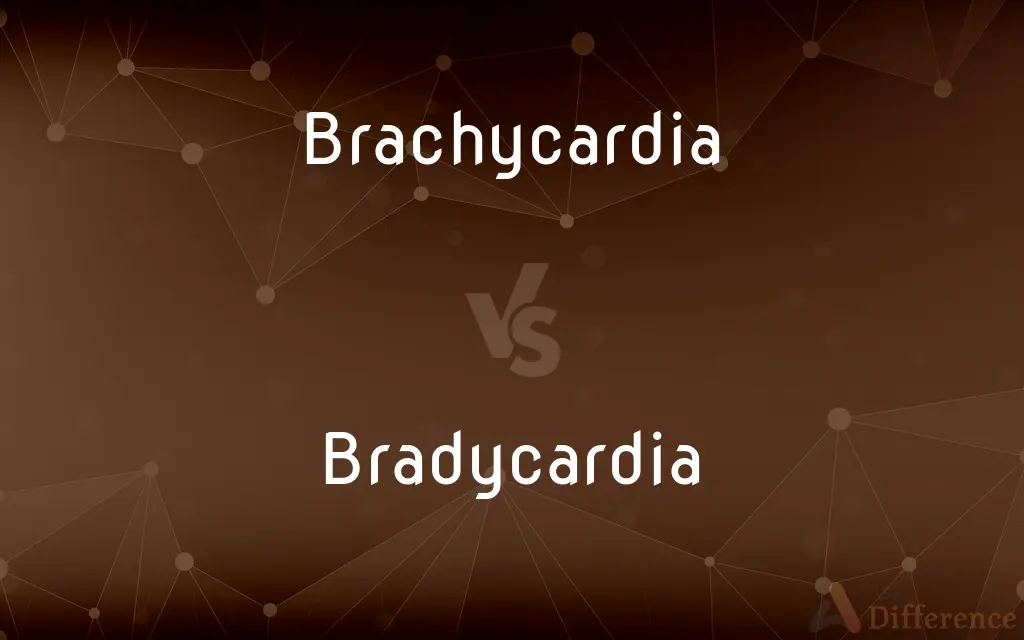Brachycardia vs. Bradycardia — Which is Correct Spelling?
"Brachycardia" is a common misspelling of the correct term "Bradycardia," which refers to an abnormally slow heart rate

Table of Contents
Which is correct: Brachycardia or Bradycardia
How to spell Bradycardia?

Brachycardia
Incorrect Spelling

Bradycardia
Correct Spelling
ADVERTISEMENT
Key Differences
"Brachy-" might remind you of a "branch," which is not what you're discussing when referring to a slow heart rate.
"Brady-" rhymes with "lady," and a lady has a heart (referring to heart rate).
Recall that "cardia" relates to the heart, and "brady" is an accepted medical prefix for "slow."
Focus on the "d" in Bradycardia, which stands for "down," referring to a decreased heart rate.
Bradycardia starts with “Bra,” like "brake," which also signifies slowing down.
ADVERTISEMENT
How Do You Spell Bradycardia Correctly?
Incorrect: The athlete's brachycardia is due to his high level of fitness.
Correct: The athlete's bradycardia is due to his high level of fitness.
Incorrect: She was concerned about her brachycardia after the physical examination.
Correct: She was concerned about her bradycardia after the physical examination.
Incorrect: A symptom of brachycardia can include fatigue and dizziness.
Correct: A symptom of bradycardia can include fatigue and dizziness.
Incorrect: Treatment for brachycardia varies depending on its cause.
Correct: Treatment for bradycardia varies depending on its cause.
Incorrect: His doctor diagnosed him with brachycardia, but he meant bradycardia.
Correct: His doctor diagnosed him with bradycardia, indicating a slower than normal heart rate.
Bradycardia Definitions
Bradycardia is a condition characterized by a slower-than-normal heart rate.
His bradycardia was detected during a routine check-up.
Bradycardia is when the heart rate falls below 60 beats per minute.
She was diagnosed with bradycardia after her ECG.
Bradycardia refers to an abnormally slow cardiac rhythm.
Bradycardia can sometimes lead to fainting.
Bradycardia is the medical term for a reduced rate of heartbeats.
The medication caused him to develop bradycardia.
Bradycardia describes a slow heart rate that may cause health issues.
Bradycardia is often treated with a pacemaker.
Bradycardia is a condition typically defined wherein an individual has a resting heart rate of under 60 beats per minute (BPM) in adults, although some studies use a heart rate of less than 50 BPM. Bradycardia typically does not cause symptoms until the rate drops below 50 BPM. When symptomatic, it may cause fatigue, weakness, dizziness, sweating, and at very low rates, fainting.During sleep, a slow heartbeat with rates around 40–50 BPM is common, and is considered normal. Highly trained athletes may also have athletic heart syndrome, a very slow resting heart rate that occurs as a sport adaptation and helps prevent tachycardia during training.The term "relative bradycardia" is used to refer to a heart rate that, although not actually below 60 BPM, is still considered too slow for the individual's current medical condition.
Abnormally slow heart action.
Slowness of the heart rate, usually fewer than 60 beats per minute in an adult human.
(medicine) The condition of having a slow heartbeat, defined as under 60 beats per minute for an adult.
Abnormally slow heartbeat
Bradycardia Meaning in a Sentence
Bradycardia is often found in athletes with high cardiovascular fitness.
Symptoms of bradycardia may require medical attention if they become severe.
Bradycardia can be an indicator of efficient heart function in well-trained individuals.
Bradycardia in newborns may have different implications than in adults.
Managing bradycardia effectively often involves lifestyle changes and medical intervention.
Patients with bradycardia sometimes need a pacemaker to regulate their heart rate.
The diagnosis of bradycardia involves monitoring the heart rate and rhythm.
In some cases, bradycardia can be a side effect of medication.
Advanced age is a risk factor for developing bradycardia.
Certain heart conditions can lead to bradycardia, requiring comprehensive treatment.
Bradycardia can lead to insufficient blood flow to the brain, causing fainting spells.
The emergency team prepared to treat the patient's severe bradycardia.
Regular check-ups can help monitor and manage bradycardia effectively.
Lifestyle modifications can sometimes improve the symptoms of bradycardia.
Bradycardia was the topic of the latest cardiology conference.
Research continues to explore the long-term effects of bradycardia on health.
Treatment plans for bradycardia are tailored to each patient's specific condition.
Bradycardia can be benign in some individuals and not require treatment.
When bradycardia is symptomatic, it may affect a person's daily activities.
A thorough evaluation is necessary to determine the cause of bradycardia.
Educating patients about bradycardia is crucial for effective disease management.
Athletes with bradycardia should monitor their heart rates during intense exercise.
It's important to distinguish between healthy bradycardia and that which indicates a problem.
Understanding the symptoms of bradycardia can help in early detection and management.
Bradycardia might signal underlying issues that require further medical tests.
Common Curiosities
Why is it called Bradycardia?
It's called Bradycardia because "brady-" means slow, and "-cardia" refers to the heart.
Which vowel is used before Bradycardia?
The vowel "a" is often used, as in "a bradycardia."
What is the root word of Bradycardia?
The root words are "brady-" (slow) and "cardia" (heart).
What is the verb form of Bradycardia?
There's no verb form; it's a noun.
What is the pronunciation of Bradycardia?
Pronounced as "bray-dee-KAHR-dee-uh."
What is the singular form of Bradycardia?
Bradycardia is both singular and plural.
Which preposition is used with Bradycardia?
"With" or "of" can be used, as in "with bradycardia" or "diagnosis of bradycardia."
Which article is used with Bradycardia?
"The" or "a" can be used.
Is Bradycardia an adverb?
No, it's a noun.
What is the plural form of Bradycardia?
The plural is also "bradycardia" or "bradycardias."
Is Bradycardia a noun or adjective?
It's a noun.
Is the Bradycardia term a metaphor?
No, it's a medical term.
Is the word Bradycardia a Gerund?
No, it's a noun.
What is the opposite of Bradycardia?
Tachycardia.
Which conjunction is used with Bradycardia?
"And" or "or," depending on context.
Is the word Bradycardia imperative?
No, it's not imperative.
What is another term for Bradycardia?
Slow heart rate.
Is Bradycardia a vowel or consonant?
It's a word, not a vowel or consonant.
Is Bradycardia a countable noun?
It's considered uncountable.
Is the word "Bradycardia" a Direct object or an Indirect object?
It can be either, depending on the sentence structure.
How many syllables are in Bradycardia?
Five syllables.
What part of speech is Bradycardia?
It's a noun.
How is Bradycardia used in a sentence?
Bradycardia can cause symptoms like fatigue and dizziness.
Is Bradycardia a collective noun?
No, it's not a collective noun.
How do we divide Bradycardia into syllables?
Bra-dy-car-di-a.
Which determiner is used with Bradycardia?
"The" or "a."
Is Bradycardia an abstract noun?
No, it's a concrete noun.
Is Bradycardia a negative or positive word?
It's generally considered negative, as it refers to a medical condition.
What is a stressed syllable in Bradycardia?
The stress is on the third syllable: "car."
Share Your Discovery

Previous Comparison
Hight vs. Height
Next Comparison
Brusk vs. Brusque











































